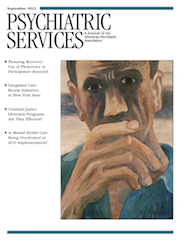Perceived Mental Health Treatment Need and Substance Use Correlates Among Young Adults
Abstract
Objectives
The relationship between perceived need for mental health treatment, reasons for not receiving care, substance use, and race and gender among young adults was examined to identify barriers to mental health care.
Methods
Data from the 2010 National Survey on Drug Use and Health for 14,718 adults ages 18 to 23 were used. Logistic regression analysis compared substance use among young adults with perceived mental health treatment need grouped by race and gender.
Results
A total of 7.6% of young adults wanted mental health treatment but did not receive care. Persons with perceived treatment need were more likely than recipients of treatment to smoke cigarettes, use marijuana, meet criteria for marijuana abuse or dependence, and engage in binge drinking, after analyses controlled for income and health insurance. White males with perceived need were 3.2 times more likely to smoke and to meet criteria for marijuana abuse or dependence and were 2.6 times more likely to engage in binge drinking. Hispanic males were 2.9 times more likely to smoke and meet criteria for marijuana abuse or dependence. White females were 1.7 times more likely than other subgroups to perceive need for mental health care.
Conclusions
Young adults with perceived mental health treatment need are at high risk of substance abuse and dependence. Results support targeting knowledge and attitudes surrounding mental health services by race-ethnicity and gender to improve willingness to receive care.



